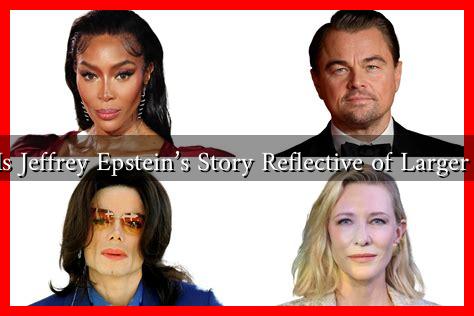-
Table of Contents
How Is Jeffrey Epstein’s Story Reflective of Larger Issues
The saga of Jeffrey Epstein, a financier and convicted sex offender, has captivated the public’s attention and raised critical questions about power, privilege, and systemic failures in society. Epstein’s life and the circumstances surrounding his crimes reflect larger issues that extend beyond his individual actions, touching on themes of sexual exploitation, the justice system, and societal complicity. This article explores these themes and their implications for society at large.
The Power Dynamics of Sexual Exploitation
At the heart of Epstein’s story is the exploitation of vulnerable individuals, particularly young women and girls. Epstein’s network included high-profile individuals, which allowed him to wield significant power and influence. This dynamic is not unique to Epstein; it is reflective of a broader societal issue where power imbalances facilitate abuse.
- Vulnerability of Victims: Many of Epstein’s victims came from disadvantaged backgrounds, making them more susceptible to manipulation.
. This highlights the need for societal structures that protect vulnerable populations.
- Normalization of Abuse: Epstein’s ability to operate for years without significant legal repercussions underscores a culture that often normalizes or overlooks sexual exploitation, particularly when it involves powerful individuals.
- Silencing Mechanisms: Victims often face intimidation and threats, which can deter them from coming forward. This reflects a systemic issue where the voices of the marginalized are silenced.
The Justice System and Its Failures
Epstein’s case also brings to light significant flaws within the justice system. His 2008 plea deal, which allowed him to serve just 13 months in a county jail for soliciting prostitution from a minor, exemplifies how the legal system can fail victims, particularly those from marginalized communities.
- Disparities in Sentencing: The leniency shown to Epstein raises questions about how wealth and status can influence legal outcomes. Studies have shown that individuals with financial resources often receive lighter sentences compared to those without.
- Victim Blaming: The treatment of Epstein’s victims in the media and legal proceedings often involved victim-blaming narratives, which can discourage others from coming forward.
- Accountability for Institutions: The failure of law enforcement and judicial systems to adequately address Epstein’s crimes reflects a broader issue of institutional accountability. Many institutions, including schools and workplaces, often fail to protect individuals from abuse.
Societal Complicity and the Culture of Silence
Epstein’s story is also a reflection of societal complicity in enabling abuse. The culture of silence surrounding sexual exploitation is pervasive, often perpetuated by fear, stigma, and a lack of support for victims.
- Media Representation: The media’s portrayal of Epstein and his victims often sensationalizes the story while failing to address the underlying issues of exploitation and abuse.
- Public Apathy: The general public’s indifference to the plight of victims can perpetuate a culture where abuse is tolerated. Awareness campaigns and education are crucial in changing this narrative.
- Role of Social Media: While social media has provided a platform for victims to share their stories, it can also contribute to the spread of misinformation and victim-blaming narratives.
Conclusion: Lessons Learned and the Path Forward
Jeffrey Epstein’s story serves as a stark reminder of the systemic issues surrounding sexual exploitation, the failures of the justice system, and societal complicity. It highlights the urgent need for reforms that prioritize the protection of vulnerable individuals and hold powerful perpetrators accountable. As society grapples with these issues, it is essential to foster a culture of support for victims, challenge power dynamics that enable abuse, and advocate for systemic change.
In summary, Epstein’s case is not just about one man; it is a reflection of larger societal issues that require collective action and awareness. By addressing these challenges head-on, we can work towards a future where exploitation is no longer tolerated, and justice is truly served.
For further reading on the impact of Epstein’s case on the justice system and societal attitudes towards sexual exploitation, visit RAINN.





